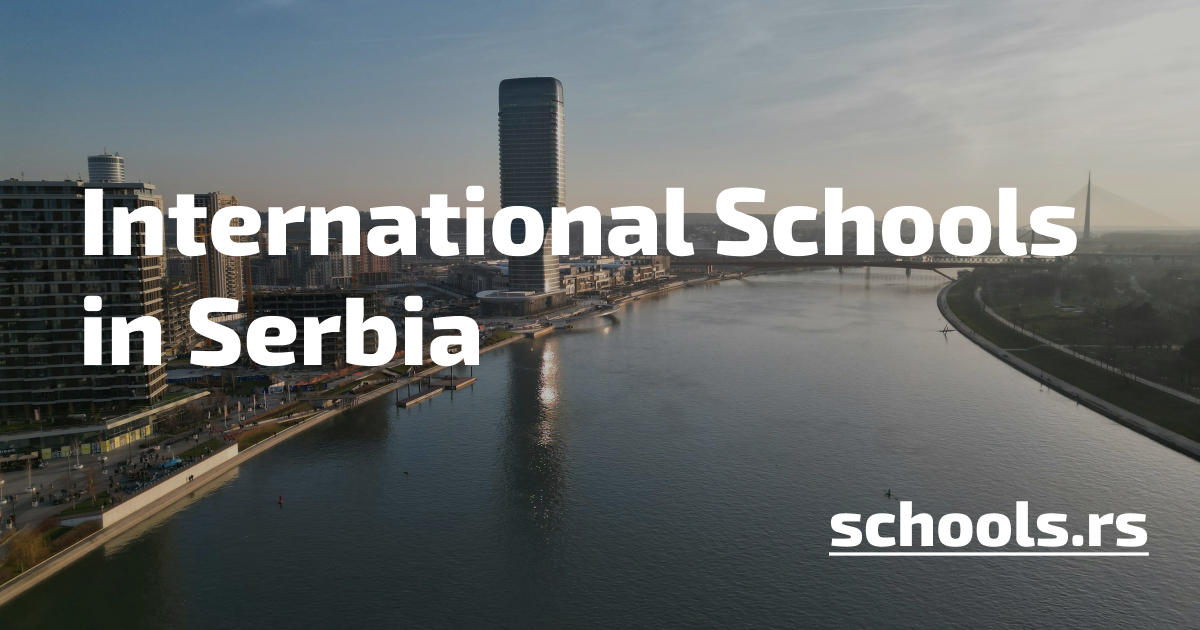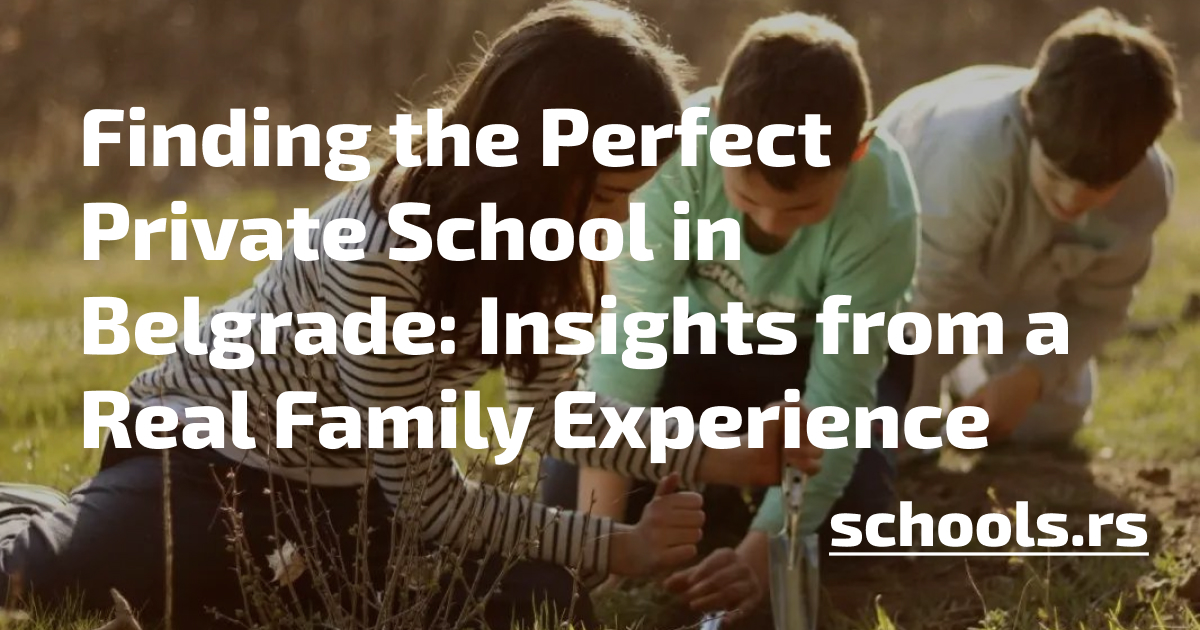Your ultimate school visit checklist
By Konstantin Levushkin · 4 minute read · Updated on June 3, 2024
If you already have a shortlist of schools you’re interested in and are preparing for a visit, it’s helpful to create a list of questions or a checklist to compare the schools. While you won’t forget the most important questions, the details can be just as crucial. For example, if a school doesn’t have personal lockers, your child will have to carry all their textbooks, which can be quite heavy in Serbia.
We have prepared the most comprehensive list of questions you can ask during your school visit. It is particularly useful for selecting private schools, but some questions can also apply to public schools. It is not necessary to ask all the questions—before your visit, print this page and mark the questions that are most important to you.
🧩 Mission and Values
These questions are aimed at assessing how well the school aligns with your cultural values and educational goals. For instance, if the school’s primary focus is academic performance and university admissions, this will significantly influence the teaching process, teacher-student relationships, curriculum, and more.
- What qualities, skills, and knowledge do you envision a graduate of your school possessing?
- How would you describe the school’s culture and values? How are these reflected in daily life?
- What are the relationships like between students and teachers, teachers and administration, parents and the school? Can you provide examples?
- What do your graduates go on to do? Where do they continue their education?
- What policies are implemented in the school? For example, what’s the stance on mobile phones, bullying, and safety?
- Does the school have a code of conduct for teachers and students? What rules are considered most important?
🧩 Admissions
Private schools often have some form of selection process. This might include psychological testing, subject knowledge assessments, and evaluating the family’s alignment with the school’s values (culture fit). The admissions process itself can provide significant insights into the school’s various aspects.
- How does the admissions process work? What qualities do you look for in a child and their family?
- What stages are involved in the selection process?
- What documents are required for admission?
- Are there entrance exams? What are they like?
- What is the demographic and national composition of the school?
- How would you describe your ideal student and their family?
- Are there students with special educational needs? How is inclusion implemented?
🧩 School Leadership
The quality of leadership is a crucial factor in a school’s development. An experienced and energetic principal and their management team can significantly improve even a struggling school. It’s also important to feel personally comfortable interacting with the principal and their deputies, as you’ll be communicating with them frequently.
- What qualifications does the principal have? How and why did they become the principal?
- Who makes key decisions in the school, and how are they made?
- Who is responsible for the academic process, discipline, safety, and school maintenance?
- What other leadership roles exist in the school? For example, are there department heads or senior teachers?
- Who owns the school, and what role do they play in its management?
- What are the school’s goals for the next year and the next five years?
- What is your relationship with the Ministry of Education?
- What role do parents play in school life?
- Is the school part of any national or international associations? What obligations does this entail?
🧩 Teachers and Curriculum
These questions help you understand what and how subjects are taught in the school.
Teachers
- What teaching roles exist in the school? For example, are there tutors and assistants?
- What is the student-teacher ratio?
- How do you select teachers? What is your ideal teacher like? What skills, knowledge, and qualities do they possess?
- Do you have a training system for teachers? How often do they receive training or retraining?
Curriculum
- What curricula do you follow? How strictly do you adhere to these programs?
- What is a typical lesson like?
- How many lessons are there per day, and how are they scheduled?
- What teaching approaches are most commonly used in the school?
- How are students assessed? Are there grades? What kind?
- How interconnected are the subjects? Are there interdisciplinary lessons?
- How many hours are allocated to [specific subject]?
- What support is provided to students who are struggling with [specific subject]?
- What extracurricular activities are offered?
- Do students participate in competitions and contests? Which ones?
- How do students prepare for final exams? Which subjects are the school’s strengths and weaknesses?
- Are there subjects given special attention?
Languages
- How strong is the English program? How many hours per week are dedicated to it?
- What second foreign language is taught? From which grade?
- Is language support provided for children whose native language is not Serbian?
- Is bilingual education implemented?
🧩 Practices
These questions provide additional information about your child’s daily life at school, such as what happens after classes end.
- How do parents receive updates about their child’s progress and setbacks? How often?
- Are there parent-teacher meetings? How are they conducted?
- What does the school do if a student is struggling with subjects, behavior, or social interactions?
- What holidays are celebrated at the school?
- What is the school’s policy on homework?
- What do students do after classes?
- How much time is allocated for breaks between lessons? Do students have enough time to rest?
- What do students do during breaks?
- What is the school’s meal plan?
- What excursions and field trips are typically organized?
- Does the school have any partners? Who are they?
🧩 Facilities
These questions help you understand the school’s physical environment and how it supports or hinders learning.
- Does the school have a library, gym, cafeteria, recreation rooms, laboratories, art spaces, teacher’s lounge, cloakroom, playground?
- Is there Wi-Fi? Are personal computers provided? Are phones and other devices used in lessons?
- Do all classrooms have projectors?
- Do students have personal lockers?
- How are the walls used? Are students’ works displayed?
- What additional resources are available? For example, does the school have a museum, collections for science lessons, advanced technical equipment (e.g., microscopes)?
🧩 Safety
We understand safety in a broad sense, from physical to digital security.
- How does the school address bullying?
- How are fire safety norms implemented?
- What training programs are conducted for children? For example, are there sex education programs or anti-bullying classes?
- Is there security, cameras, or other measures to protect against intruders?
- What happens if there is a conflict between students or between a student and a teacher?
- What is the school’s policy on vaccinations?
- What happens if a serious infection appears at the school?
- Can students bring their own food? How does the school protect students with food allergies?
- Are there separate toilets for teachers?
- Do teachers undergo first aid training?

